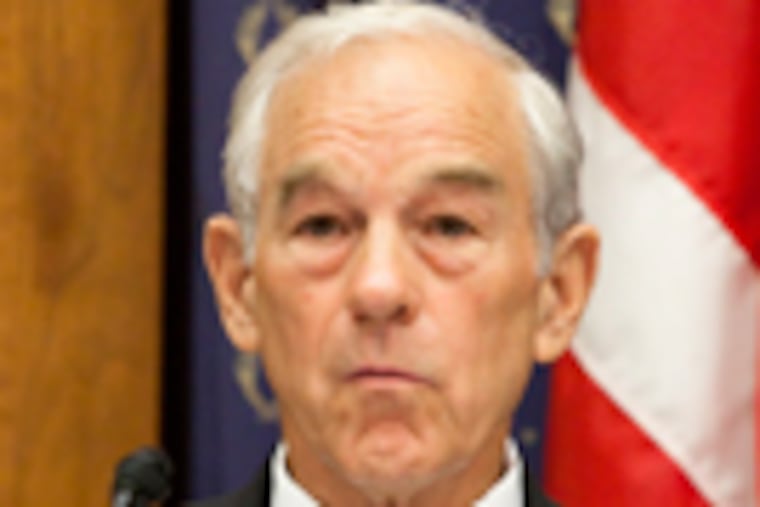PhillyDeals: Kill off the Fed? History provides lessons
'End the Fed" is a book by U.S. Rep. Ron Paul (R., Texas). Last year, Paul introduced the Federal Reserve Board Abolition Act in Congress. Last week, Republicans named him head of the House committee that monitors the Fed.

'End the Fed" is a book by U.S. Rep.
Ron Paul
(R., Texas). Last year, Paul introduced the Federal Reserve Board Abolition Act in Congress. Last week, Republicans named him head of the House committee that monitors the Fed.
Is Paul, a free-market, hard-money advocate, really going to kill the central bank? He backpedaled a bit, telling Bloomberg TV he would "not really, not right up front" kill the central bank. "But obviously that's the implication," he concluded.
Last time the United States ended its central bank, Andrew Jackson was president, and the central bank was in Philadelphia, which fell right into a long financial depression, along with the rest of the country.
For the next 70 years, the United States rode a boom-and-bust cycle that lured many of our ancestors here to opportunities in factories, mines,
and trade - then kicked them into the streets in the howling depressions that froze business in the 1850s, 1870s, and 1890s.
Finally Congress set up the Federal Reserve in 1913. Our elected representatives ordered the Fed, not just, as I wrote last month, to fight inflation and boost employment, but also to act as "lender of last resort" in a crisis, as Villanova University economics professor David Nawrocki reminds me.
How's the Fed doing? "The Fed's job is to stop the run, and it didn't do it" in the 2008 financial crisis, Nawrocki told me. "Letting Lehman Bros. fail froze the credit markets, and let the run spread to AIG, the money market funds, and the list goes on."
President George W. Bush's forceful Treasury secretary, Henry Paulson, finally stepped in with massive financial support.
Didn't that work OK? Last week, AIG said it's going to pay back the government at a profit, like the big banks already have.
Maybe - but the rescuers waited too long, magnifying the damage, says Nawrocki. Nearly 10 percent of Americans are still out of work, tens of millions underemployed. Private-sector banks and investors are still deleveraging, writing down their losses.
A big divide among economists is between conservatives who say that markets are natural and efficient and that government should get out of their way, and liberals who say that markets are inherently unstable and, as Nawrocki says, "have to be tended like a garden" by vigilant regulators.
Markets match buyers and sellers at efficient prices, but only when people believe in them. When buyers and sellers panic, markets fail.
That's where the Fed is supposed to step in - and has: After Philadelphia's giant Penn Central railroad failed in 1970, the Fed pumped billions into banks that financed other suddenly shaky corporations such as Lockheed and Chrysler. When the stock market fell in 1987 on Ronald Reagan's watch, the Fed backed bank loans to traders, allowing the markets to recover before business panicked.
Nawrocki attributes the Fed's 2008 stumble to "a conservative ideology" that feared to seize or save key institutions until it was too late.
If we kill the Fed, what happens in the next panic?
Last time we had a central bank, its advocates were conservative, hard-money businessmen, and its opponents were subprime borrowers and lenders who convinced President Jackson the bank was holding back the nation.
Now it's the reverse. To critics like Ron Paul, the Fed is an inflationary money-printing machine hijacked by free-spending, debt-addicted bureaucrats; only free money markets using a tangible currency (like gold) brings sustainable growth and prosperity.
But power abhors a vacuum. Kill the Fed, and behind it stands the Treasury, beholden to the president; and Congress, scared of voter retaliation if it attempts something painful, like balancing the budget.
The Fed is subject to public pressure - the president appoints its chairman, local business owners and bankers and nonprofit bosses man the boards that appoint many of its members - but it is insulated from direct political dictates.
By ending the Fed, Paul and other Fed-killers, instead of strengthening free markets, would put more financial power right in the hands of our politicians.
Do we trust them?
PhillyDeals:
Performance Review for Federal Reserve
Rep. Ron Paul (R., Texas) has a new book titled "End the Fed." What kind of job is the central bank really doing and should it be abolished?
PhillyDeals, C3.